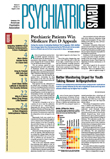In its first hearing to look at mental illnesses as biologically based diseases, a congressional panel with oversight of federal mental health programs highlighted multiple areas in which federal support has fallen short of the rhetoric.
The House Energy and Commerce Subcommittee on Health held a hearing on June 28 to discuss mental illness, its costs, and the state of research on the issue. Committee leaders said the hearing aimed to increase awareness of psychiatric disorders, rather than to encourage the passage of mental health parity legislation, but some committee members pressed the issue anyway.
“The president in 2002 said he favored ending discriminatory insurance. We should join him in his forward thinking,” said Rep. Anna Eschoo (D-Calif.). “There seems to be an attitude in Congress that we can take some baby steps, but we can't take the last full step that we need: parity.”
Subcommittee Chair Rep. Nathan Deal (R-Ga.) said passage of parity legislation (HR 1402)—which has 227 cosponsors—is less likely to pass in the House of Representatives than is increased mental health funding.
Supporters of the parity legislation highlighted its potential economic benefits for the nation, including a reduction in the estimated $180 billion in lost productivity every year related to mental illness.
Opponents of the measure focused on concerns that mental health parity would “run up the cost of health insurance for everyone,” said Rep. John Shadegg (R-Ariz.). This ran counter to arguments made by parity supporters, who highlighted a 2001 report by the federal Office of Personnel Management that found that added mental health benefits for federal employees increased costs by just 1.3 percent; other research has arrived at similar conclusions.
Shadegg said health care costs for employers are already accelerating so fast that U.S. companies are on the verge of becoming uncompetitive in a global marketplace where many overseas businesses do not bother with such coverage.
Rep. Sherrod Brown (D-Ohio) said the flaw in thinking that parity would lead to expensive coverage of a “popular” service is based on the mistaken idea that many people use mental health care recreationally.
Besides parity legislation, committee members and witnesses concentrated on the recent plateau that federal mental health research funding has reached in the Fiscal 2007 budget.
“It is unacceptable that this Congress, which has doubled the research funding of the NIH [National Institutes of Health] in the past, has allowed it to now flatline,” said Rep. Tammy Baldwin (D-Wis.), about such plans as President Bush's proposed budget that holds funding for the NIH to the 2006 level of $28.6 billion.
Thomas Insel, M.D., director of the National Institute of Mental Health, did not directly press for more funding but described ongoing research into new targets for treatment and ways to use current treatments more effectively.
“We are now on the verge of significant advances that will move us closer to predictive, preventive, and personalized mental health care grounded in research,” Insel said.
Rep. Tim Murphy (R-Pa.), a psychologist, also highlighted financial concerns when he noted that untreated mental illness can increase the risk for other ailments such as heart disease and doubles the cost of health care.
“Without integrating the cost of the body with the care of the brain, our current system is wasting billions of dollars,” he stressed.
Murphy cited research that found that when depression management was included in employee health plans, productivity increased more than 6 percent, and absenteeism declined 28 percent, while saving $2,601 for each affected employee. He also cited research that found that workers with depression who receive treatment incur $882 less in medical costs each year on average.
Rep. Sue Myrick (R-N.C.), who said her now-adult granddaughter was diagnosed with bipolar disorder at 13, helped organize the hearing. She and others said society was ready to accept mental illness without stigma—the way it did cancer 20 or 30 years ago.
“People who had cancer 20 years ago wouldn't tell anyone because they were scared they would look weak or might even lose their job,” said Myrick, who survived breast cancer. “Today, people with brain disease face the same problems in society.”
Among the most passionate testimony was that dealing with mental illness's contribution to many of the nearly 30,000 suicides each year in this country. Kay Redfield Jamison, Ph.D., a professor of psychiatry at Johns Hopkins School of Medicine who suffers from bipolar disorder, asked for research funding commensurate with the pain and death mental illness causes.
“Mostly, I have been impressed by how little value our society puts on saving the lives of those who are in such despair as to want to end them,” Jamison said.
